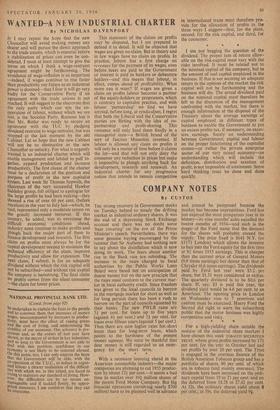WANTED-A NEW INDUSTRIAL CHARTER
By NICHOLAS
DAVENPORT
IF I may repeat the hope that the new Chancellor will avoid making money any dearer and will pursue the direct approach to the trade unions, which is essential before a stabilisation of , prices can even be con- sidered, I must at least attempt to give the terms on which I think a wage-restraint agreement might be forthcoming. The avoidance of wage-inflation is so important âindeed, if wages continue to rise faster than productivity our future as an industrial power is doomedâthat I fear it will go very badly for the Conservative Party if an agreement with the trade unions is not reached. It will suggest to the electorate that the only party which can win the co- operation of labour, without which we are lost, is the Socialist Party. Rumour has it that Mr. Butler was ready to secure an agreement with the TUC by pledging dividend restraint to wage restraint, but was stopped at the last moment by the old Cabinet. Let us hope that the new Cabinet will not be so obstructive or the new Chancellor so unlucky. For what is urgently wanted is an industrial charter which will enable management and labour to pull to- gether, expand production and increase productivity. The first clause of the charter must be a declaration of the position and purpose of profit in the new capitalist system. Last week Sir Thomas Sopwith, the chairman of the very successful Hawker Siddeley group, felt obliged to apologise for the large profits he had been makingâthey showed a rise' of over 60 per cent. (before taxation) in the year to July lastâwhich, he said, represented only a moderate return on the greatly increased turnover. If this country, he added, was to overcome the difficult economic conditions ahead, industry mast continue to make profits and Plough back the major part of them to finance development and research. The first claim on profits must always be for the capital development needed to maintain the technical efficiency of the plant, improve productivity and allow for expansion. The next claim, I submit, is for an adequate dividend without which the risk capital will not be subscribedâand without risk capital the company is hamstrung. The final claim on profits comes from the silent consumer
the claim for lower prices.
This statement of the claims on' profits may 'be disputed, but I am prepared to defend it in detail. It will be objected that wages are given no claim. But in theory and in law wages have no claim on profits. In practice, labour has a first charge on revenues for the payment of its wages, even before taxes are paid to the Government or interest is paid to bankers or debenture holdersâand this means that labour, in effect, comes ahead of profitability. What more can it want? If wages are given ⢠a claim on profits labour becomes a partner of the equity-holders or proprietors, which is contrary to capitalist practice, and with labour 'partnership' we find we have arrived, before long, at syndicalism. I regret that both the Liberal and the Conservative parties are flirting with the idea of co- partnership and profit-sharing. This romance will only land them finally in a managerial stateâa British brand of the sort of fascism Mussolini invented. If labour is allowed any claim on profits it will only be a matter of time before it claims the lotâand that will not only deny the consumer any reduction in prices but make it impossible to plough anything back for development, research and renewals. An industrial charter for any progressive nation that intends to remain competitive in international trade must therefore pro- vide for the allocation of profits, in the three ways I suggestâfirst, for the plant, second, for the risk capital, and third, for the consumer.
I am not begging the question of the dividend. The proper rate of return allow- able on the risk-capital must vary with the risks involved. It must be related not to the nominal capital of the company, but to the amount of real capital employed in the business. If that is not securing an adequate return in the opinion of the market the risk capital will not be forthcoming and the business will die. The actual dividend paid on the nominal capital must therefore be left to the discretion of the management confronted with the market, but there is enough information at the disposal of the Treasury about the average earnings of capital employed in different types of business to enable the Government to put an excess profits tax, if necessary, on exces- sive earnings. Surely an understanding between Government, capital and labour on the proper functioning of the capitalist systemâor rather the private enterprise sector of our very mixed economyâan understanding which will include the definition, distribution and taxation of profit, is not impossible of attainment. Some hard thinking must be done and done quickly.


































 Previous page
Previous page